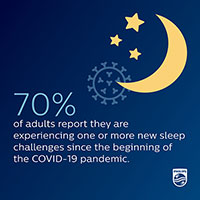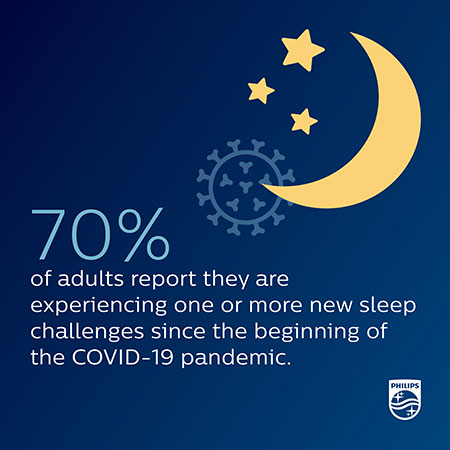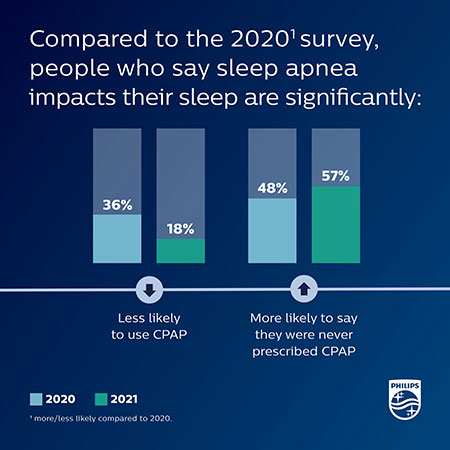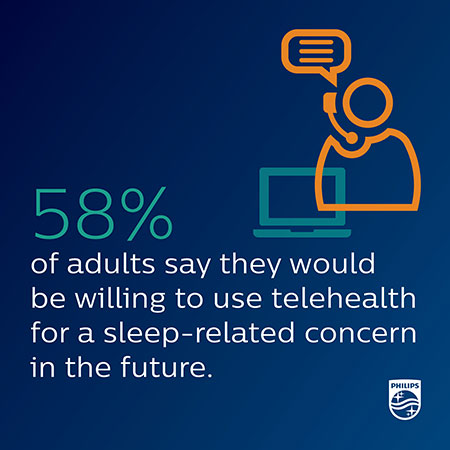Survey: COVID-19 Wreaked Havoc With Sleep Patients
New Philips survey shows 70% of people experienced new sleep challenges since the start of the pandemic — and 72% of patients who stopped therapy did so because of it.
 Sleep and Respiratory equipment maker Philips released the findings of its sixth annual sleep survey in a report titled Seeking Solutions: How COVID-19 Changed Sleep Around the World, and with the world marking the first anniversary of the pandemic, it’s clear COVID-19 had an impact on sleep patients.
Sleep and Respiratory equipment maker Philips released the findings of its sixth annual sleep survey in a report titled Seeking Solutions: How COVID-19 Changed Sleep Around the World, and with the world marking the first anniversary of the pandemic, it’s clear COVID-19 had an impact on sleep patients.
The survey took responses from 13,000 adults in 13 countries to capture attitudes, perceptions, and behaviors around sleep and found that since the beginning of COVID-19:
- Seventy percent of respondents experienced one or more new sleep challenges, with 60 percent reporting that the pandemic had directly impacted their ability to sleep well.
- Seventy-two percent of sleep apnea patients surveyed who reported they discontinued CPAP therapy did so due to COVID-19-related reasons.
- Fifty-eight percent reported a willingness to use telehealth for a sleep-related concern, aligning with Philips’ commitment to delivering connected care telehealth support to people at home.
According to the survey, sleep apnea continues to impact the quality of sleep across the world, with a slight increase reported by those who have been diagnosed with 12 percent in 2021 vs. 9 percent in 2020.
Most important to HME, sleep apnea patients have struggled with CPAP therapy during COVID-19:
- This year’s survey revealed a drop in the portion of sleep apnea patients using their CPAP, with 18 percent in 2021 compared to 36 percent in 2020.
- There was an increase in the share who have never used the CPAP they were prescribed with 16 percent in 2021 compared to 10 percent in 2020.
- As mentioned, 72 percent of those who discontinued CPAP therapy cited COVID-19 related reasons. Those reasons ranged from financial challenges (55 percent) to having limited access of supplies (44 percent).
- Most concerning to the survey was that 57 percent of those living with sleep apnea reported they had never been prescribed CPAP at all.
The survey also showed there is strong interest in implementing tools and strategies, such as telehealth, online information resources, and lifestyle changes, to address these challenges:
- Thirty-four percent turned to online searches to learn more about treatments to improve sleep.
- With the increased reliance on telehealth during the pandemic, 58 percent of respondents expressed a willingness to seek help for sleep-related concerns in the future from a sleep specialist via telehealth services.
- That said, 70 percent believed it would be difficult to find a sleep specialist through an online or telephone-based program.
“This year’s survey results confirm what we’ve known to be true for a while: with the right solutions, care doesn’t have to be defined by a place, but instead by the needs of the individual and his or her condition,” said Dr. Teofilo Lee-Chiong, MD, Chief Medical Liaison, Sleep & Respiratory Care at Philips. “The tools required to deliver telehealth efficiently and reliably already exist, and the interest from consumers is apparent, particularly in the face of COVID-19.
“When used properly, sleep telehealth has the potential to enhance efficiency and quality of care, improve health outcomes, empower patients to make informed decisions, and provide equitable healthcare for all,” he continued. “Extending the reach of patient care through technology means we empower providers to confidently guide patients across multiple settings and transitions of care, driving better health outcomes.”
Infographic images from Philips:


